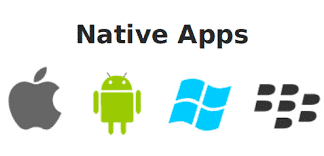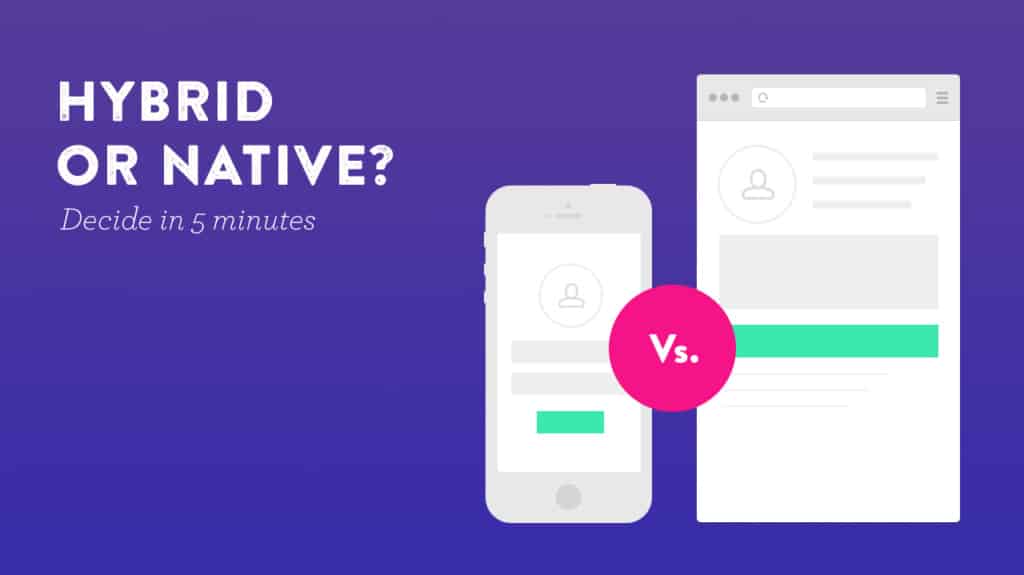Hybrid vs Native Mobile App Development?
The advancement of technology in 2018 has led to a completely new level of interaction between users and companies through mobile technology.
There are apps available nowadays, for any requirement that you could possibly have. That is, you can find apps for ride sharing, matrimonial, dating, ordering food, availing a service, Gaming, music, insurance, etc. You name it and the service is available at your fingertips through mobile apps.
The most common question that pops up before app development is the use of technology, i.e. native vs hybrid app development.
This decision depends on various factors such as:
– The speed at which the app needs to be developed
– What is the company trying to accomplish with the app
– The budget approved for app development
– The list of features to be incorporated into the app
Native Mobile App Development aka Native Apps?
Native apps are the apps developed for specific devices. For example, iPhone apps are written in Objective-C / Swift whereas the Android app is written in Android SDK Java
Pros:
- Full Device Integration – It can interact with the device’s operating system features like camera, contact us, microphone, etc.
- Excellent Performance – Native apps are developed separately for specific operating systems, and hence they are faster and more refined compared to hybrid apps. High-performance apps or games should be developed in native apps
- Easy App Store Discoveries – Native apps can be easily accessible through app stores. According to researchers, 47% of iPhone users and 53% of Android users discover apps in Apple App Store or Google Play Store. This, in turn, is a very effective strategy to boost your app discovery rate
- Better UI/UX – Native apps offer their users a natural experience as they have specific UI/UX standards defined for development. Native app’s smooth and descriptive transitions allow building a seamless experience for users who are well aware of the app’s standard interface and navigation.
- Internet Connection Not Required – Depending on the functionalities developed, native apps allow users to work without an internet connection, which is an important feature when users find themselves in no Wi-Fi zone. Whereas hybrid apps cannot be accessible without the internet connection
Cons:
- Increased Development Costs – Native apps require multiple code bases to be maintained by developers thus making the task more complex. This generates higher development costs. On the other hand, a hybrid app has single code base.
- Involves More Developers – Native app creation is a time-consuming job and involves more work which in turn arises the need to hire more developers for the job. The developers should possess the accurate knowledge to develop apps for different operating systems.
Hybrid Mobile App Development
Hybrid apps comprise web apps based on a mix of HTML5 and native apps. They’re usually built with HTML5 and JavaScript. The code is then wrapped in a native container which allows accessing some native features.
Pros:
- Easy Development Process – Hybrid apps don’t require different developers with specific operating system knowledge. They can be managed by a few developers and thus ensure speedy app development. Hybrid apps work on both platforms. Adding new functionality thus becomes easier as it is a one-time process.
- No Specific Requirements – Hybrid apps don’t require developers to possess native Android or iOS knowledge. In fact, the look and feel of native apps can be achieved using C# with frameworks like Cordova or PhoneGap Wrapper
- Low Cost – Hybrid app development is an easy and hassle-free process as you don’t need to develop two different apps for Android and iOS. This also makes the development cost-effective.
- Best For Apps With Quick Release Cycles – Since hybrid apps need to be developed once for Android and iOS, the development time and cost is reduced to half. This, in turn, works best for applications that have short release cycles. Also, hybrid apps are preferred in cases where frequent updating is required.
Cons:
- Poor UX/UI – Hybrid apps fail to achieve seamless first experience with impeccable UX/UI. Hence, they can never provide rich UI/UX features like native apps
- Lack Of Native Features – Android and iOS provide native features which cannot be implemented in hybrid apps. For example, the Render Script feature which is good computation engine used to accelerate app during computational tasks cannot be implemented in hybrid apps
- Low Efficiency – Hybrid apps are slower than their native counterparts
- Performance Issues – Hybrid apps are less refined and might cause performance issues where the app requires high performance. This may result in user disappointment as they might abandon apps with lag issues out of frustration
The difference can be summarized as:
Native apps can be used when high-performance is expected to achieve through an app. Although it requires good budget and a sufficient time frame.
Hybrid apps can be used where the budget is low and there are quick release cycles required.


